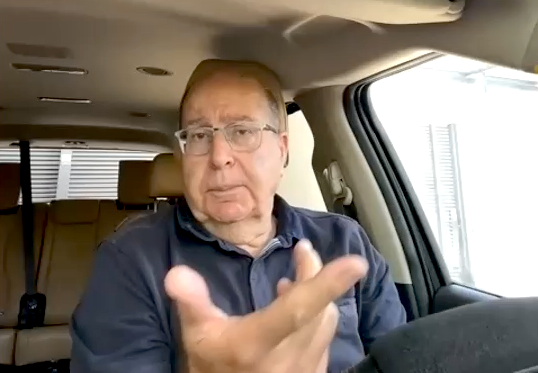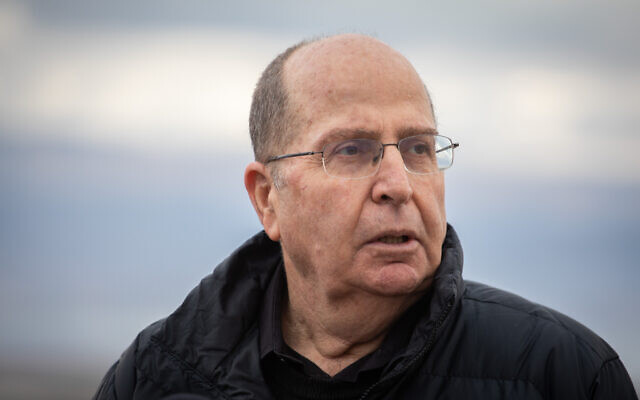Top General offers Insights into Israel’s strategic challenges
‘There is no real Arab-Israeli conflict,’ former Israeli Defence Minister and IDF chief says
The latest Australia/Israel & Jewish Affairs Council (AIJAC) webinar was addressed by Lt. Gen. Moshe (Bogie) Ya’alon, former Israeli Vice Prime Minister, Minister for Defence and IDF Chief of Staff, who spoke about “Countering Iran’s three front proxy war against Israel”.
He noted there is currently a battle for strategic hegemony in the region between three Islamic elements, Iran which has been aiming to export its revolution and have the region follow Shi’a Islam since its 1979 revolution; jihadist Sunnis seeking an Islamic caliphate; and the Muslim Brotherhood.
Iran, he said has strengthened its grip around the Middle East through proxies, including Hezbollah, which it has armed with 150,000 missiles, drones, sophisticated air defences and ground to sea missiles. He added that any decision to launch a war against Israel from Lebanon will come from Teheran, not Beirut. It also has Shi’a militias around the region commanded by Iranian officers, has established a stronghold in Syria to establish another front against Israel, and, in the Palestinian areas, Palestinian Islamic Jihad is an Iranian arm, financed and directed by Iran, while Hamas is also mainly funded by Iran.
He said the jihadist Sunnis are in retreat after IS was defeated, but still active in Iraq, Syria, Lebanon, Africa and the Sinai, and occasionally against Israel, while the Muslim Brotherhood’s unofficial leader is Turkey’s President Erdogan, who seeks a neo-Ottoman empire, but must be cautious for financial reasons.
He added that Israel formerly allied with the region’s non-Arabic countries, but now has strategic relations with most Sunni Arab states, so the Sunni Arab camp with Israel opposes Iran and the jihadists, and is a rival to Turkey, and there is no real Arab-Israeli conflict.
He explained that Israel’s issues with Iran are because the Iranian revolution brought about a strategy that there needs to be a Shi’a Middle East to bring back the Messiah, the Mahdi, while Israel must be wiped off the map, because there is no room for a Jewish state in land considered Islamic. Iran’s regime, he said, will make sacrifices to achieve this, but prefers to attack through proxies.

He added that Iran also pursues its strategy against Israel through global terrorism, including two devastating bombing attacks in Argentina in the 1990s, and recent attempts in Cyprus, India, Georgia, and Africa, which Israeli prevented.
Ya’alon is unsure whether Iran has decided to acquire nuclear weapons capacity itself, but can now enrich uranium to the level needed for a bomb, and aims to be able to produce everything necessary for a nuclear weapon, including missiles. He said its missiles can currently reach 1,300 km, but they’re aiming for 10,000 km.
He added that Iran hasn’t achieved weaponisation, which is the most challenging part. Iran tried to do so prior to 2003, but stopped out of fear that it would be attacked if it did weaponise. Israel, he said, has implemented a policy that it won’t tolerate a hostile, nuclear-armed country in the region. In 1995. Iran thought it would manage weaponisation by 2005, but still hasn’t, maybe due to a deliberate decision, or challenges it encountered, such as viruses or “work accidents”.
He said Iran’s regime is the main generator of regional instability, and not just against Israel, using proxies including the Houthis in Yemen and others in north Africa. Israel is pursuing its “campaign between wars”, including bombing in Syria and some in Iraq, to prevent Iran’s aspiration to be on Israel’s border. Iran is deterred from attacking Israel, but has impressive capabilities, including precise, well-equipped UAVs which destroyed Saudi oil facilities in 2019. However, Israel is well-equipped with defensive measures, such as Iron Dome, Arrow and David’s Sling. Moreover, the best defence is a good offence, so Israel should be ready with that too.
He believes Hezbollah is unlikely to provoke a war, as it still fears Israel and is unwilling to pay the price of hostilities in terms of what Israel will destroy.
He said to stop Iran acquiring military nuclear capabilities and stop its arms proliferation, missile development and terrorism, there should be a strategy combining isolation, economic sanctions, and a credible military threat, which must be led by the US.


comments